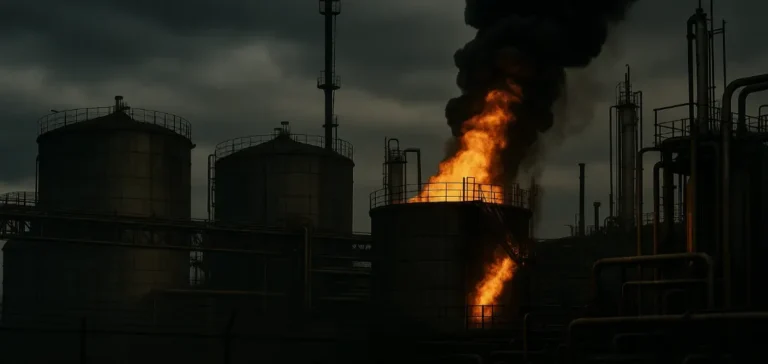Ukraine launched a series of drone attacks on Russian territory on its Independence Day. These strikes hit several strategic energy infrastructures, including a nuclear power plant in the Kursk region and an oil terminal near St. Petersburg. The events occur as international mediation efforts struggle to advance and tensions remain high between the two capitals.
According to the operator of the Kursk nuclear power plant, a drone shot down by Russian air defenses caused the explosion of an auxiliary transformer, leading to the temporary reduction of a reactor’s output. No casualties were reported, and authorities stated that radiation levels remained within safety standards. Moscow had already accused Kyiv in 2024 of attempting to target this sensitive facility when it was located in a combat zone.
Fire at oil terminal and economic impact
On the Baltic coast, the interception of ten drones caused a fire at an oil terminal operated by Novatek, according to the regional governor. Emergency services were quickly mobilized to contain the incident. This episode adds to a series of strikes against Russian refineries and oil depots in recent weeks. Kyiv aims to restrict the financial resources Moscow uses to support its military offensive.
These attacks come amid rising fuel prices in Russia. The government has suspended certain gasoline exports, while the Russian Ministry of Energy attributed the surge to seasonal demand and agricultural activity, without mentioning the Ukrainian strikes.
Balance of power and diplomatic impact
Since the beginning of the conflict in February 2022, Russia has maintained control of about 20% of Ukrainian territory, including Crimea, annexed in 2014. The Russian army claimed new gains in the Donetsk region, advancing toward the city of Kostyantynivka, an important logistics hub for Ukrainian forces. At the same time, the Ukrainian Air Force reported intercepting part of the 72 Shahed drones and one ballistic missile launched by Russia on the same day.
On the diplomatic front, prospects for a meeting between Vladimir Putin and Volodymyr Zelensky appear increasingly distant. Hungarian Prime Minister Viktor Orban sought the support of Donald Trump to address supply disruptions via the Druzhba pipeline, which he attributed to a Ukrainian strike. These developments increase international pressure as Washington and several European capitals try to maintain a negotiation dynamic.
Consequences for regional energy security
The International Atomic Energy Agency (IAEA) continues to warn about the risks facing nuclear power plants in conflict zones, particularly the Zaporijjia facility, occupied by Russia since 2022. Recent strikes highlight the vulnerability of energy infrastructures at the core of military and diplomatic challenges.
The growing number of incidents around strategic sites undermines regional energy security and reinforces the dependence of international negotiations on the stability of these installations. The issue of their protection remains a central point of tension in peace discussions.






















